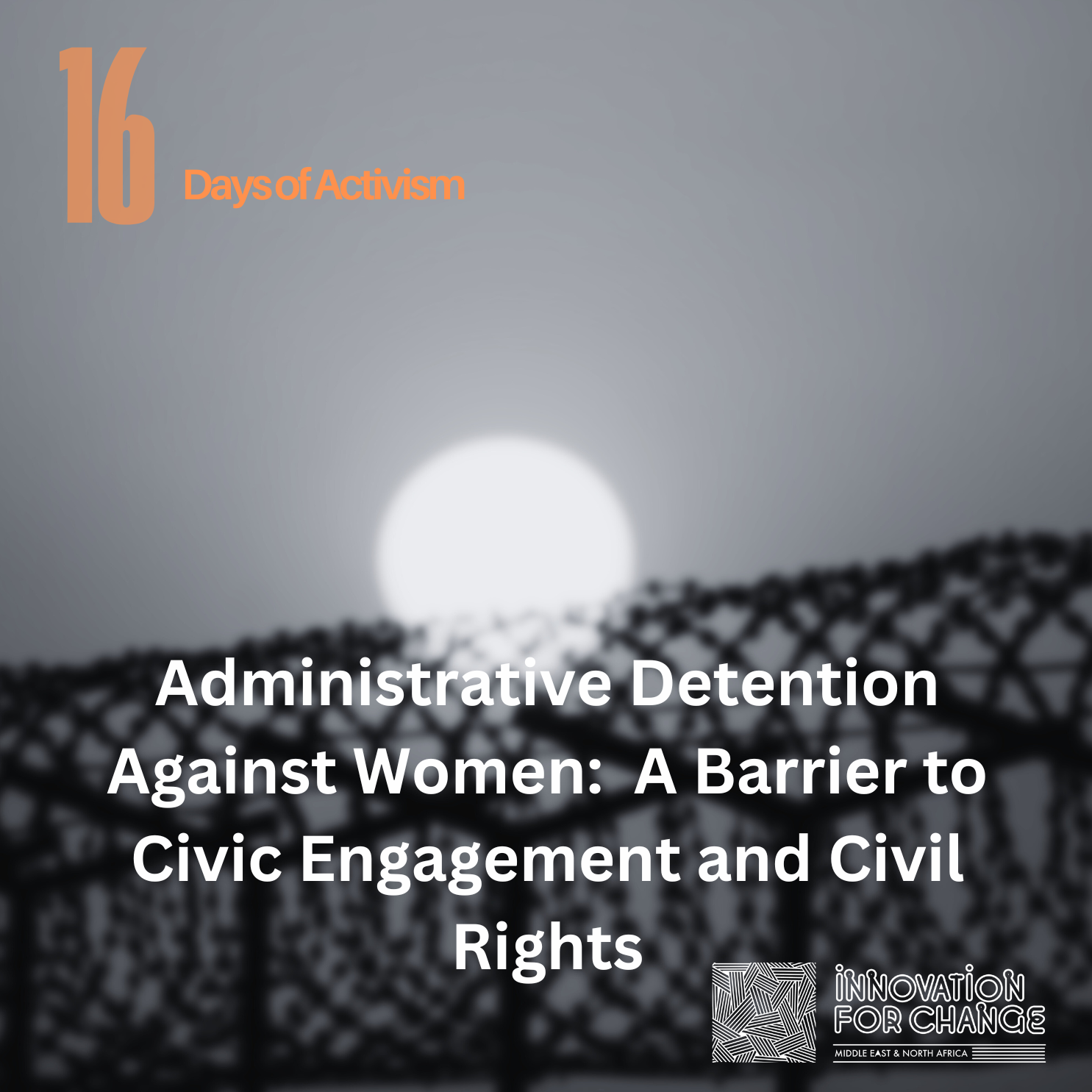
The issue of using detention, against women and girls in the Middle East and North Africa and particularly in the occupied Palestinian territories remains a significant concern for human rights. Despite criticism and calls for change the Israeli military authorities persist in employing this practice specifically targeting women and girls who exercise their fundamental rights to freedom of expression, assembly and association.
The continued use of detention against women and girls serves as a vivid reminder of the ongoing oppression they endure under Israeli occupation. As discussed further in this article this practice acts as an obstacle to engagement, impedes progress towards gender equality and undermines the democratic rights of Palestinian women and girls.
Recent news has highlighted the need to address this matter. In October 2023 a group of women was detained without charge or trial for protesting. This incident is one example among many where Palestinian women are subjected to detention—often held for months or even years without fair trials or access to legal representation.
The military’s utilization of detention, against Palestinian women and girls not only violates their fundamental rights but also amounts to collective punishment.
It is used to silence disagreement, stifle activism and generate fear among communities. The global community should continue to exert pressure to bring an end to this practice and guarantee that Palestinian women and girls enjoy their rights as mandated by international law.
The remaining portion of this article will delve deeper into the prevalence of detention targeting women and girls in the Middle East and North Africa (MENA) region. It will specifically focus on the impact of this practice on women and girls shedding light on calls for reform as well as broader implications for civic engagement and civil rights in the region.
The Restrictive Impact of Administrative Detention on Womens Civic Participation
detention frequently targets women who actively engage in society advocating for their rights expressing dissenting opinions or participating in peaceful protests. By silencing these voices governments effectively hinder the development of an inclusive society impeding progress, towards gender equality and wider democratic reforms.
The fear of being detained can discourage women from engaging in activism or public discourse. The uncertainty surrounding detainment without procedures can deter them from exercising their fundamental rights to freedom of speech and assembly. Consequently they become further marginalized.
Furthermore the experiences of being held in detention centers can have an impact on women leaving them traumatized and reluctant to participate in life once again. The sense of isolation, the absence of representation and the potential for mistreatment while in detention can have lasting psychological effects. These challenges make it challenging for women to regain their voices. Actively pursue their activism.
Case studies that shed light on how administrative detention suppresses women’s civil rights are strikingly evident in Egypt. In times numerous Egyptian women have been detained without any charges for exercising their right to peaceful protest expressing critical opinions or allegedly violating so called “morality” laws. These detentions send a message to women effectively discouraging them from questioning the state of affairs and advocating for their rights.
As of 2022, there were an estimated 60,000 people held in pre-trial detention in Egypt, with many of them held without charge or trial. Women are disproportionately represented among these detainees.
Syria, Yemen, Saudi Arabia, Morocco and Algeria and Tunisia: The exact number of administrative detainees in these countries is unknown, but it is estimated to be in the thousands. Women are believed to make up a significant portion of this population.
Similar circumstances prevail in Palestine where Palestinian women and girls have been subjected to detention by military authorities. Such detentions often occur without charges or supporting evidence with detainees being denied access to fair trials. Human rights organizations condemn the use of detention against women as it violates their fundamental rights while serving as a tool of oppression.
As of October 2023, there were approximately 440 Palestinian administrative detainees held by Israel. Women make up approximately 5% of this population.
In order to foster inclusivity and democracy, within the MENA region it is imperative that governments dismantle the practice of detention—particularly when used against women—and create open civic spaces that empower all individuals equally.
To achieve this we must prioritize the importance of upholding the principles of justice ensuring treatment, for all and respecting the rights of every individual. It is also crucial for governments to create an environment that fosters and safeguards womens active involvement in affairs. This involves promoting freedom of speech allowing people to gather and associate freely granting women equal access to employment opportunities and addressing gender based discrimination and violence.
By creating spaces where women can actively participate in politics and empowering them to engage in the decision making process the MENA region can take steps towards building a society that’s fairer and more just. In such a society the rights and voices of all individuals will be. Protected.
Lets now look at situations in countries;
In Egypt; By 2022 it was estimated that 60,000 individuals were being held in trial detention without charge or trial. Unfortunately women are disproportionately represented among these detainees.
In Palestine; As of October 2023 440 Palestinian administrative detainees were being held by Israel. Women account for 5% of this group.
Regarding Syria, Yemen, Saudi Arabia Morocco Algeria Tunisia; Although we do not have numbers regarding detainees, in these countries estimates suggest that there are thousands. It is believed that a significant number of these detainees are women.